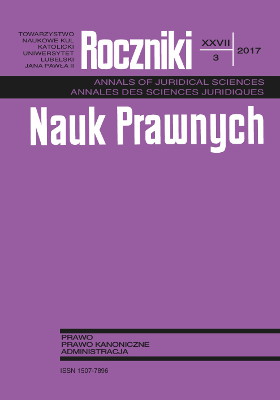Zaburzenia psychiczne sprawcy czynu zabronionego jako przedmiot rozpoznania w procedurze wykroczeniowej po 1 lipca 2015 roku
Mental Disorders of a Perpetrator of an Illegal Act as Subject to Examination in the Petty Offences Procedure after 1 July 2015
Author(s): Iwona Bień-WęgłowskaSubject(s): Law, Constitution, Jurisprudence, Criminal Law
Published by: Towarzystwo Naukowe KUL & Katolicki Uniwersytet Lubelski Jana Pawła II
Keywords: insanity and partial sanity in the Code of Petty Offences; court’s and psychiatric diagnosis in petty offences procedure; obligatory defence in petty offences procedure
Summary/Abstract: The imputability of guilt to a perpetrator of a petty offence is determined by such circumstances as the legally required age and mental condition. Mental disorders that entail insanity or partial sanity, as provided in the Code of Petty Offences, result in major limitations as to the acknowledgment of an act as illegal or the instituted course of proceedings, which, consequently, excludes guilt or restricts liability. Doubts regarding the offender’s mental fitness lead to the appointment by the authorised judicial body of expert psychiatrists to perform a psychiatric examination. Yet, such doubts must be justified, objective, and supported by evidence or observations of the authority in charge of the proceedings. The opinion of an expert psychiatrist is pivotal to the proceedings as it explains the offender’s conduct during and after the committed illegal act, which helps determine whether their mental condition allow their participation in the proceedings, including self-defence. The court’s and psychiatric diagnosis also leads to adverse consequences for the examined individual and, therefore, must not be regarded as a mere formality in any petty offence case. The Act of 27 September 2013 amending the Code of Petty Offences and some other acts revised the procedures applicable in petty offence cases, e.g. regarding the provisions on the content of psychiatric opinion issued by the appointed experts and the formal obligatory defence. The article aims to look into the scope of this revision and the impact of changes on the exercise of procedural guarantees of the offender.
Journal: Roczniki Nauk Prawnych
- Issue Year: 27/2017
- Issue No: 3
- Page Range: 7-26
- Page Count: 20
- Language: Polish

